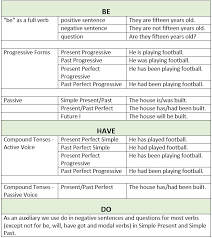An auxiliary verb helps the main (full) verb and is also called a “helping verb.” With auxiliary verbs, you can write sentences in different tenses, moods, or voices. Auxiliary verbs are: be, do, have, will, shall, would, should, can, could, may, might, must, ought, etc.
- I think I should study harder to master English.
- I am having a cup of coffee.
- You have been practicing hard.
- It was written by a petitioner.
- You may choose what you like.
The verb forms of be, do, and have can be used either as a main (full) verb or an auxiliary verb. The following examples show these verbs used as auxiliary verbs.
1. “Be” as an auxiliary verb
a.Used in progressive sentences:
- I am taking a bath.
- She is preparing dinner for us.
- They have been studying all night.
b.Used in passive sentences:
- I was given a free meal.
- He was seen by fans at the airport.
- This song has been sung by all nations.
2.”Do” as an auxiliary verb
a. Used in negative sentences:
- I do not know the truth.
- She doesn’t agree with me.
- They didn’t arrive here yet.
b.Used in questions:
- Do you want to have another one?
- Did he finish his homework?
- Do we need to keep going straight?
3.”Have” as an auxiliary verb
a. Used in perfect sentences:
- I have been following you for a mile.
- We have done a lot so far.
- She had been queen of the town.
[Quiz 19.1]
Identify all auxiliary verbs in the following paragraph.
I have just heard that you didn’t attend the meeting yesterday. Did you have a conflict with that time? I must ask that you explain the reason.
[Quiz 19.2]
Which of the following sentences does not show any auxiliary verbs?
1)I didn’t have any reason to go there.
2)Have we practiced this song enough?
3)Three seats have been reserved for us.
4)I am a professor in the economics department.
